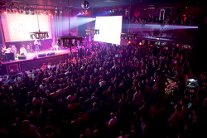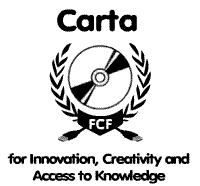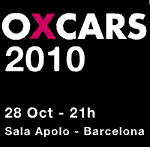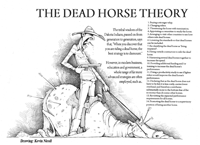International Forum on Access to Culture and Knowledge in the Digital Era – Organization and Action
Barcelona, October 28 to 31 (2010)
About the Forum
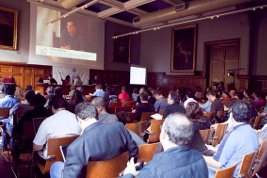
The FCForum is an international arena in wich to build and coordinate action around issues related to free/libre culture and access to knowledge.The FCForum brings together key organizations and active voices in the spheres of free/libre culture and knowledge, and provides a meeting point where we can find answers to the pressing questions behind the current paradigm shift.
Against the powerful lobbies of the copyright industries, the FCForum is a space for the construction of proposals arising from civil society in order to strengthen citizen’s positions in the debate around the creation and distribution of art, culture and knowledge in the digital era.
The FCForum, which takes place in tandem with the 3rd oXcars Festival – the biggest free/libre culture event of all time ; ) –, is a three-day event of international scope in which to organize strategies that encompass different solutions and proposals from around the world, so that they add up and complement each other. It aims to build a shared response to the asymmetrical pressure exerted on governments by the lobbies of a particular sector of the industry.
At last year’s FCForum we created the Charter for Innovation, Creativity and Access to Knowledge, a comprehensive legal compendium that has been adopted as a Charter by many organizations around the world. The document covers over 20 years of legal proposals for adapting copyright legislation to the digital era, and was drafted by more than 100 specialists and major organizations from twenty different countries.
It has turned out to be a very effective tool for counteracting reactionary legal proposals from content industries lobbies such as ACTA, and the Spanish Law for Sustainable Culture, among others.
The 2010 FCForum
In 2010, a key moment in this historical struggle, it is crucial that there be a discussion based on how to defend and generate new economic models that emerge in the digital era.
This will be the main topic of the 2010 FCForum.
Before the debate closes down and we end up with legislation that only reflects the interests of governments, industries and lobbies, it is essential that we provide answers on how free/libre culture can be sustainable.
Many people and groups are working on this and we consider that is important to display a common front.
Much has already been done and said in this regard. We believe in intelligence ![]() and evidence-based policy. We will use all this background as a starting point, (essential bibliography).
and evidence-based policy. We will use all this background as a starting point, (essential bibliography).
The plan is to address sustainability in several areas, most importantly, we think, in terms of:
We will also discuss the different legal, technological and other challenges in the field of:
Working Areas:
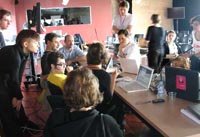
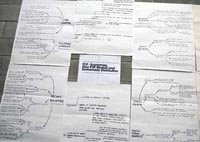
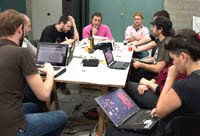
There are four areas to work on in this years’s FCForum:
- What organizationals principles can economically and independently sustain open online collaboration? What specific sources of sustainability are working now?
Open online collaboration requires some infrastructure such as servers, URL, etc. We can identify several provision models to sustain such infrastructure, such as foundations, corporations, forms of self-provision, etc. It is urgent that we develop new models of online infrastructure provision that are not based on anti-free/libre culture conditions (proprietary software, non data portability, etc.) and are also economically sustainable. The idea is to reflect on both kinds of successful experiences: Non-profit infrastructure provision (such as Wikipedia), and also for-profit models which combine net-enabler conditions and “fair” business formulas, such as Wikia, Wikitravel, Meetup or Wikihow…
- How do we stimulate creativity in the digital era?
The most common attacks against the free/libre culture are: “it’s not sustainable”, “it destroys employment”, “it doesn’t seek profit, so it is bad for artists”… It is now time to coordinate a unified base of answers against this fallacies.
There is also an urgent need to reconcile different hypotheses around the idea of incentives to creativity that can better adapt to the digital era. We need to recover the original idea of author’s rights as an input for artists and society’s creativity in general, such as, for example, the General Comment Nº17 (2005) addressed by the United Nations Committe on Economic, Social and Cultural Rights. It is also necessary to rethink the role and the characteristics of the creative community today, in the consumer-producer era, as well as the role of the cultural industries as contributors to the process and no longer as its exploiters.
- What tools and methods exist or should be developed to reform policy?
The purpose of this workshop is both to introduce existing tools to those policy reform organizations not already familiar with them, and to facilitate further development of these and other tools by drawing on the experience, needs and expertise of policy reform NGOs, particularly those with a focus on the EU. This workshop encourages users and tool providers to explore together more effective methods of action.
- How can we improve access to information in the public sector?
This panel will approach and discuss the different legal, technological and factual challenges that lie in the field of Open Public Sector Information; not only in terms of PSI availability, but in terms of PSI re-use as well. Discussing the various European PSI initiatives at both national and local scale, shall provide a useful starting point for thinking about what has/has not been done so far; what could have been done better; and what should be done in order to make such valuable and abundant information widely available to entities and citizens, and then re-usable for commercial or non-commercial purposes.
Working Plan:
OPENING NIGHT // October 28: The oXcars
October 28: Working groups
- Working groups: Open Public Sector Information and Tools for policy reformers
October 29: Presentations of Hypotheses
The working methodology of the FCForum is to organize participants into different working groups with each group working on several hypotheses, so that we all tend towards creating and overall strategy. There won’t be any long speeches, just short presentations of some different hypotheses as the starting point for discussion.
October 30: Discussion
The discussion will revolve around the points of friction between the different proposed models, in order to find ways to bring them closer together and make them more compatible. We believe in developing forms that make it possible to include and improve all the different options that are brought to the table, so that they empower each other.
October 31: Conclusions
Our desired outcomes are as follows:
- To create of a Guide-Handbook for the sustainability of new economic models in the digital era
- To strengthen and expand the global complicity and the network for action that already exists in the FCForum
FSF, 1996

